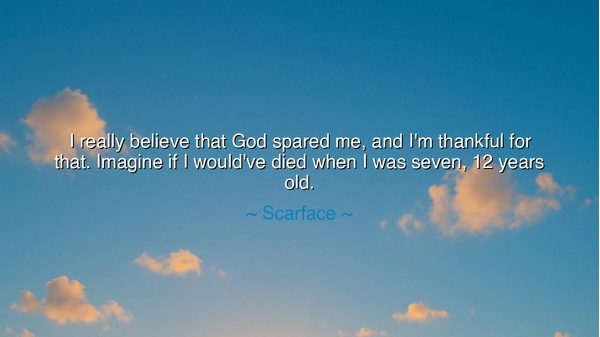
I really believe that God spared me, and I'm thankful for that.
I really believe that God spared me, and I'm thankful for that. Imagine if I would've died when I was seven, 12 years old.






Hear the words of Scarface: “I really believe that God spared me, and I'm thankful for that. Imagine if I would've died when I was seven, 12 years old.” These are not idle musings, but the voice of one who has walked the shadowed valleys of life, who has tasted near-destruction, and yet emerged breathing. His words tremble with both awe and humility, for he knows that his survival is not the work of chance alone, but a mercy granted, a reprieve that demands gratitude. To live past the moments where death could have claimed him is, in his eyes, a sign of divine purpose.
The origin of this reflection rests in Scarface’s life—a life marked by hardship, by illness, by the temptations and dangers of the streets. From childhood he faced trials that could have ended him, whether through violence, despair, or frailty of health. Yet he stands and speaks these words as a man who survived what many do not. His gratitude is not shallow thanksgiving for comfort, but a profound recognition that simply to have lived beyond his childhood is itself a miracle. Thankfulness here is not for luxury or fame, but for breath, for time, for the chance to walk longer upon the earth.
History gives us echoes of this truth. Consider the life of Marcus Aurelius, who as a child was often sickly, yet survived to become emperor and philosopher. In his Meditations, he often reflected on the fragile thread of life and the need to give thanks for each day spared. Or think of Frederick Douglass, who as a young slave could have been broken or killed before ever escaping bondage. Yet he lived, he endured, and because his life was spared, he became a voice for freedom that changed nations. Scarface’s words flow in the same river: survival itself is purpose, and being spared means life has more to unfold.
There is also in his reflection the reminder of mortality and humility. Many live as though life is guaranteed, wasting days in bitterness or vanity. Scarface’s words pierce through this illusion: life could have ended at seven, at twelve, at any moment. Every year lived is a gift, every breath a mercy. To recognize this is to be humbled, to see that one is not invincible, but spared. This humility breeds gratitude, and gratitude transforms survival into wisdom.
Yet his words are not only about survival—they are about purpose. If he was spared, then it was not without reason. To live when one might have died is to carry a responsibility: to use one’s time wisely, to shape one’s voice for others, to bear witness to what might have been lost. Gratitude that does not transform into action is incomplete. Scarface shows us that to be thankful for life is also to live with intention, with awareness that every day spared is an opportunity to fulfill what one was meant to do.
The lesson is clear: life itself is the first blessing. Before wealth, before honor, before fame—life is the foundation. To be spared from death, whether in childhood or in trial, is a call to gratitude and to purpose. Many forget this, chasing shadows while ignoring the miracle of breath. But the wise remember: if you are alive today, you are blessed. If you have endured danger, sorrow, or near-destruction, your survival is a testimony of meaning yet to be revealed.
Practical actions rise from this teaching. Begin each day by giving thanks simply for being alive. Reflect on the trials you have endured and recognize them as proof that your story is not finished. Let gratitude for survival shape the way you treat others—with kindness, with humility, with love—because you too were spared. And most of all, live with intention: if you have been given more time, do not squander it on bitterness or vanity, but dedicate it to what is worthy, lasting, and true.
Thus, let Scarface’s words endure: to be spared is to be chosen, to be alive is to be blessed, and to be thankful is to live wisely. For life is fragile, death ever near, but gratitude transforms survival into destiny, and destiny into legacy.






AAdministratorAdministrator
Welcome, honored guests. Please leave a comment, we will respond soon